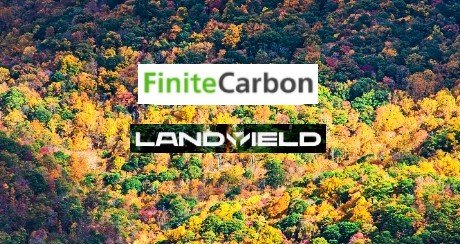In a groundbreaking collaboration, Finite Carbon and LandYield are revolutionizing the voluntary carbon market (VCM) by breaking barriers and opening new opportunities for family forest landowners to benefit from carbon credits.
Finite Carbon is a North American developer of forest carbon offsets and BP acquired a majority stake in Finite Carbon back in 2020 for an undisclosed amount. The company has developed over 3.9 million acres of high-quality forest carbon projects.
LandYield, a newly founded Tennessee startup, aims to give family forest owners access to carbon markets. Their goal is to give them the opportunity to earn by keeping their forests standing, enhancing carbon sequestration and forest value.
Their collective expertise will simplify carbon revenue opportunities for non-industrial landowners, starting in 13 southeastern states in the U.S. Together they launched a new initiative called CORE Carbon platform for landowners to efficiently enroll into a carbon offset program.
A Platform for Verified Forest Carbon Credits
Family or non-industrial forest landowners own about 275 million acres of forestlands. But fewer than 1% of them benefit from the carbon market.
The new platform seeks to bring that percentage up by allowing landowners with 40 to 5,000 acres of forestland to earn extra income from carbon credits, otherwise called carbon offsets. Those who are eligible can start enrolling in the program.
Here are the two key features of the program:
Flexibility: landowners may decide to enroll just a part of their land in the program. They can also continue doing commercial activities in the enrolled land like gathering non-timber products and leasing rights to hunters.
Financial benefit: landowners will get quarterly compensation through carbon credits if they comply with the program’s reporting and monitoring requirements. The CORE Carbon platform manages and simplifies the process via its dashboard.
Leveraging Finite Carbon’s software and remote sensing expertise, the CORE Carbon platform features an advanced, easy-to-use digital mapping tool for landowners. It aids them to come up with a free carbon revenue proposal for their forestland while providing ongoing project management.
The program is also using satellite imagery and data from the U.S. Forest Service to keep track of forest growth. This information is crucial for measuring the exact amount of carbon emission reductions and removals resulting from improved forest management practices on enrolled forestland.
Accurate monitoring and reporting of carbon stocks is vital for generating verified and quantifiable carbon credits.
The carbon offset projects are verified under the American Carbon Registry’s scientific methodology – Improved Forest Management on Small Non-Industrial Private Forestlands (SNIPFL) – specifically meant for family forests.
Supplying high-quality forest carbon offsets, falling under nature-based solutions, is even more critical today when criticism against them turns heavier.
The launch of the CORE Carbon platform comes at perfect timing. It can help address issues in producing quality forest offsets, which can bring the prices up again.
Breaking Barriers to Financial and Climate Benefits
To perform all the necessary tasks, Finite Carbon has delivered over $900 million in forest carbon deals. These collaborations involve forestland investment firms, nature conservation groups, and foresters.
The company’s partnership with LandYield in launching the carbon program is yet another important milestone. Highlighting its significance, Finite Carbon CEO, Sean Carney, said:
“We’re excited to team up with LandYield to create long-term, mutually beneficial relationships with a broad range of landowners by providing a financial incentive for their environmental stewardship so people can enjoy their land for generations to come.”
LandYield delivers the payments to enrolled landowners who defer timber harvests and enhance their lands’ carbon sequestration abilities.
By committing to make notable forest management changes, landowners contribute to long-term climate benefits. This 40-year commitment involves growing their forests for 20 years and keeping them standing for another 20 years.
The platform enables LandYield to provide landowners with instant estimates of how much income they can potentially earn with carbon credits.
LandYield benefits from the support of Mercuria Energy Group, one of the world’s largest independent energy and commodity groups, which plans to buy the offsets they generate. Mercuria intends to use the forest carbon credits to offset emissions of their fossil-fuel businesses. They will then sell the rest to other companies looking to cut their own carbon emissions.
The carbon program is initially open for landowners in the southeastern US, which boasts up to 120 million acres of family-owned forest land. The region includes Florida, Georgia, South Carolina, North Carolina, Virginia, Tennessee, Kentucky, Alabama, Mississippi, Arkansas, Louisiana, Texas, and Oklahoma. The program will cover other parts of the country as it expands.
Last year, a similar program was launched by the American Forest Foundation – the Family Forest Carbon Program. The program seeks to help family forest landowners with as little as 30 acres gain access to the $2-billion carbon market.
By breaking barriers and offering financial incentives for environmental stewardship, Finite Carbon and LandYield have taken a significant step towards promoting nature-based solutions and sustainable forest management. Their initiative is a win-win solution for both landowners and the planet, fostering a greener future for generations to come.

